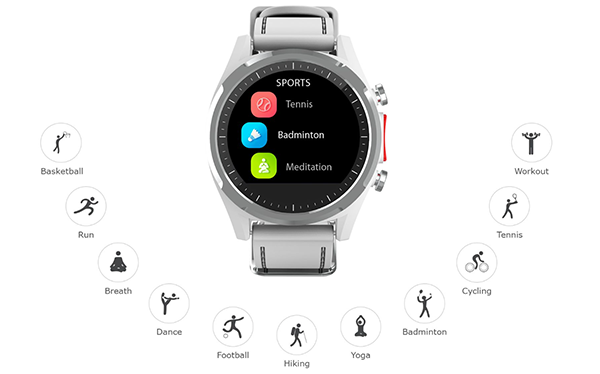Smartwatches are wearable technology that helps you track your health. Smartwatches also have features like calling, messaging, GPS tracking, and many more. You just wear it on your wrist and turn on tracking, and it will track and display the results.
Smartwatches are becoming increasingly popular in the health tracking field. People are becoming more aware of tracking their health. With this, you can monitor your health anytime without any problems. Due to these features, smartwatches are gaining popularity.
Smartwatches are not limited to just calling and messaging. They now combine technology with fitness and healthcare. With fitness and health features combined, you are enabled to track your fitness with the help of technology.
Sensors in Smartwatches: The Core of Health Tracking
Smartwatches have become essential for tracking health and fitness. The secret behind their accuracy lies in the sensors they use. Here’s a simple breakdown of the key sensors that power health tracking:
- Heart Rate Monitor: This uses optical sensors to track your heartbeats. It shines light onto your skin and measures the light reflected back to count your heart rate.
- Accelerometer: This sensor tracks your movements and activity levels. It helps the watch understand how many steps you’ve taken, how fast you’re walking, or if you’re running.
- Gyroscope: This sensor detects the orientation and motion of the smartwatch. It works with the accelerometer to improve activity tracking, such as identifying different types of exercises.
- SpO2 Sensor: This measures your blood oxygen levels. It helps track how well your body is absorbing oxygen, which can be crucial for fitness and overall health.
- ECG Sensor: The ECG sensor monitors the electrical activity of your heart. This can help detect irregular heartbeats and provide early warnings for certain heart conditions.
- Temperature Sensor: Some smartwatches also come with temperature sensors to track your body temperature, which can offer insights into your overall health and well-being.
Each of these sensors plays a vital role in turning your smartwatch into a powerful health companion, helping you stay informed and proactive about your health.
How Smartwatches Sync Data for Analysis
Smartwatches have become essential gadgets for tracking daily activities, sleep, heart rate, and much more. But how do these devices sync data and provide meaningful insights? Let’s break it down:
The Role of Smartphone Apps in Syncing Data
When you wear a smartwatch, it constantly collects data about your movement, health, and other activities. To make this data useful, smartwatches sync with smartphone apps. The app acts as a hub, receiving the raw data from the watch through Bluetooth or Wi-Fi. This process happens in real-time or whenever the devices are near each other. The smartphone app organizes and stores the data in a way that’s easy to access and understand.
Visualizing and Analyzing Data for Trends
Once synced, the smartphone app helps turn this raw data into clear, easy-to-read charts and graphs. For example, it might show your daily step count, calories burned, or sleep patterns in colorful visuals. Over time, the app also tracks trends, showing you how your health metrics change week by week or month by month. This makes it simple to spot improvements or areas where you need to focus, like increasing your activity or getting better sleep.
Sharing Data with Healthcare Professionals
One of the most useful features of modern smartwatches and their apps is the ability to share your health data. Many apps allow you to send detailed reports directly to healthcare professionals. This makes it easier for doctors to track your heart rate, sleep, or fitness progress and to give you personalized advice based on real data. In some cases, this feature can even provide early warning signs for potential health issues, improving your overall care.
Importance of Smartwatch Health Tracking
If you regularly monitor your health and fitness, you can see if your health is improving or not. If the result is not good, you can contact specialist doctors who will help provide treatment. Essentially, smartwatches are indicators of your health or fitness. Their results give you an alert about your health. If you know about a potential health issue early, you can take action before something serious happens. It is more convenient to have health data at your fingertips, allowing you to easily track and work on the results provided.
Smartwatches offer a simple and convenient way to keep track of our health. They can monitor things like heart rate, steps, sleep, and even stress levels, all from our wrists. This makes it easy to stay informed about our well-being without needing extra devices or effort. As technology advances, smartwatches are likely to become even more powerful, with features that could help predict health issues before they happen. The future of smartwatches in health looks promising, offering more personalized and proactive care.

